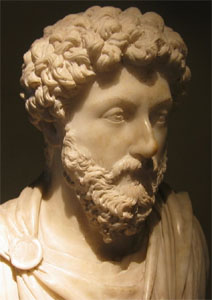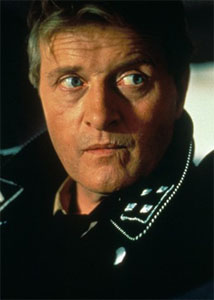Tagline: Final Fantasy VII is the best CRPG to have hit the market since the last installment of the Ultima series. Although the plot is railroaded, that’s not really the point – the story is excellent, the characters touch your heart, the gameplay is engaging, and the interface is intuitive and simple, but also powerful. This game is addictive.
 Normally I’m fairly skeptical concerning computer roleplaying games. Of all the games I have ever played only the Ultima series of games ever really succeeded. It succeeded because Richard Garriott, the creator of the Ultima series, designed a series of games which slowly became more and more adept at modeling the real world. Because people behaved the way real people do (with varying daily schedules, speech patterns, and personalities), because no problem possessed a single solution (with a set of rules behind world interactions, allowing you to blow a door up if you can’t find the key to it), because there was more than one course which could be followed (with a deep, intriguing plot with sundry subplots and side plots included), because you got to really care about your traveling companions. For all these reasons and more it is easy when playing the Ultima series of games to simply let yourself slip into the role of the Avatar. Does it allow the same breadth as face-to-face gaming? No. But it does allow roleplaying, and it does give you some things which face-to-face gaming cannot. The Ultima series acknowledges its weaknesses and exploits its strengths. It may not be better at what paper-and-pencil roleplaying can do, but it isn’t a paper-and-pencil roleplaying game so I respect these games for doing what they do – you can’t expect a computer game to do the same things a traditional RPG does; nor should you try.
Normally I’m fairly skeptical concerning computer roleplaying games. Of all the games I have ever played only the Ultima series of games ever really succeeded. It succeeded because Richard Garriott, the creator of the Ultima series, designed a series of games which slowly became more and more adept at modeling the real world. Because people behaved the way real people do (with varying daily schedules, speech patterns, and personalities), because no problem possessed a single solution (with a set of rules behind world interactions, allowing you to blow a door up if you can’t find the key to it), because there was more than one course which could be followed (with a deep, intriguing plot with sundry subplots and side plots included), because you got to really care about your traveling companions. For all these reasons and more it is easy when playing the Ultima series of games to simply let yourself slip into the role of the Avatar. Does it allow the same breadth as face-to-face gaming? No. But it does allow roleplaying, and it does give you some things which face-to-face gaming cannot. The Ultima series acknowledges its weaknesses and exploits its strengths. It may not be better at what paper-and-pencil roleplaying can do, but it isn’t a paper-and-pencil roleplaying game so I respect these games for doing what they do – you can’t expect a computer game to do the same things a traditional RPG does; nor should you try.
Now, here comes the surprise. Final Fantasy VII is a highly successful game, despite the fact that it fails to do almost everything which the Ultima series does so well. The world of FF7 is contrived, the plot is almost completely linear, and multiple solutions do not exist in most cases. But FF7 does do one thing right: It presents characters who you can care about, characters with distinct (although sometimes cliched) personalities. As an almost direct result FF7 succeeds; and it helps that although the plot is linear, it is a very interesting and dynamic plot. You shouldn’t approach FF7 so much as a roleplaying game as a movie in which you have some partial control over the main character.
THE GOOD STUFF
I’ve already pointed out a couple of things. The main strengths of this game are, in my opinion, the plot and the characters – which are really intertwined with each other. There were points in this game where I felt genuine sadness and genuine joy as the plot and the characters developed. This, more than anything else, was what made the game very addictive to me.
Another major strength of the game lies in the graphic department. The visuals are highly anime-influenced, imaginative, and effective. Definitely a treat, especially the magic spells.
Finally, this game has a fantastic interface. It was originally designed for the Sony Playstation before being later translated onto the computer (which is where I played it). Everything is controlled through a series of intuitive menus which are accessed from the numeric keypad. A template to lay over the keypad comes with the game, but you won’t need it for long – the controls are easily learned and, once committed to memory, the entire system is easily memorized. Players will find the combat system, in particular, to be highly entertaining – it’s abstracted, but this allows for a great deal of strategic planning which I find difficult to obtain in other games where the chaos of the battlefield usually means I have no chance to control what my characters are doing.
This is a fairly powerful combination for a game to have: Intuitive, powerful gameplay; interesting characters; compelling plotline; and excellent graphics all in the same package? I should already have you sold. Why aren’t you out buying the game yet?
THE BAD STUFF
I’m a strong proponent of not judging a product on things which it is not attempting to do. Obviously you would never critique a hammer by saying “it’s not a screwdriver”, but in the area of creativity (such as novels, music, television, film, roleplaying games, or computer games) it is all too easy to slip into critiquing a product because it is not the type of product you happen to like. So, on that level, I don’t think FF7 has any serious weaknesses: It sets out to do exactly what it excels at accomplishing.
That being said, I should reiterate that this is not a “roleplaying game” in the sense that you are given a role which you are then allowed to control with broad parameters. In this game you are given a role, but the course along which you are allowed to guide that role is fairly proscribed when all is said and done. But saying “this game sucks because you aren’t allowed to control the characters” is similar to critiquing, say, Babylon 5 because you weren’t allowed to control the actions of Sheridan. FF7 resides somewhere between mediums (such as television or film) where you aren’t allowed any control over the characters and the mediums (such as roleplaying) where you are. Its important to judge the game on that ground, but I think it fair to warn off those who won’t find that type of entertainment, well, entertaining.
CONCLUSION
Buy this game. ‘Nuff said.
Style: 5
Substance: 5
Company/Publisher: Squaresoft / EIDOS
Originally Posted: 1999/02/17
This review was first published thirteen years ago almost to the day. That’s really kind of weirding me out. Interesting how times turn, though: I’ve actually been replaying FF7 on my PS3 the past couple of weeks.
I know it’s cliche for people to say SPOILER SPOILER SPOILER was the first time they cried because of a video game. It wasn’t mine (Ultima VII: Serpent Isle beat it by half a decade), but it remains one of the most memorable moments in any fictional medium for me. There is a very fine art to putting me on rails in a video game and yet getting me to completely invest myself in the character: The experience is more akin to acting than to roleplaying, but when it succeeds it can be very, very powerful. And in FF7 it succeeded brilliantly.
For an explanation of where these reviews came from and why you can no longer find them at RPGNet, click here.


 William Boulle first ran for national office in 1956 as Adlai Stevenson’s running mate. Although they were handily defeated by the Eisenhower-Nixon ticket, Boulle distinguished himself as a strong campaigner – particularly in the early primary states. Boulle would run unsuccessfully in 1960 against John F. Kenendy and then retire from politics in 1964 when his senatorial term ran out. In 1968 Boulle emerged from retirement to once again attempt to capture the democratic nomination. His domestic and anti-war policies caught the imagination of the people and he proved immensely popular at the ballot box. Tragically, however, Boulle would be assassinated immediately after declaring victory in the California primary by Sirhan Sirhan. Bobby Kennedy would go on to win the nomination and, then, the general election against Richard Nixon.
William Boulle first ran for national office in 1956 as Adlai Stevenson’s running mate. Although they were handily defeated by the Eisenhower-Nixon ticket, Boulle distinguished himself as a strong campaigner – particularly in the early primary states. Boulle would run unsuccessfully in 1960 against John F. Kenendy and then retire from politics in 1964 when his senatorial term ran out. In 1968 Boulle emerged from retirement to once again attempt to capture the democratic nomination. His domestic and anti-war policies caught the imagination of the people and he proved immensely popular at the ballot box. Tragically, however, Boulle would be assassinated immediately after declaring victory in the California primary by Sirhan Sirhan. Bobby Kennedy would go on to win the nomination and, then, the general election against Richard Nixon.











